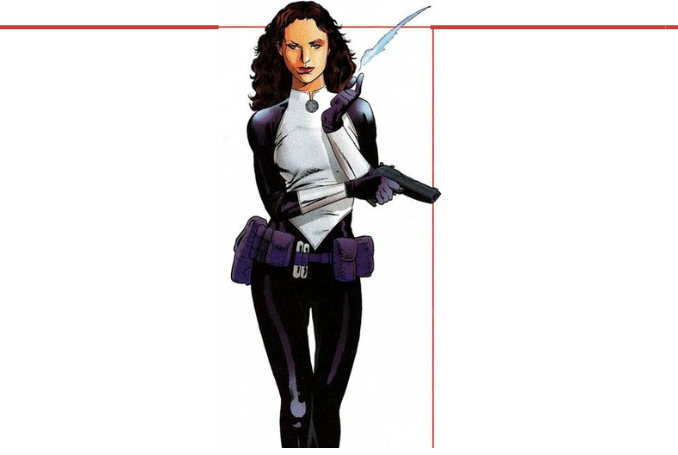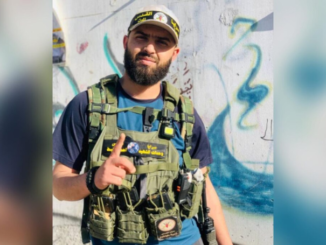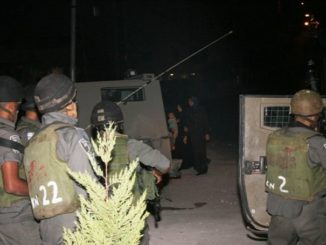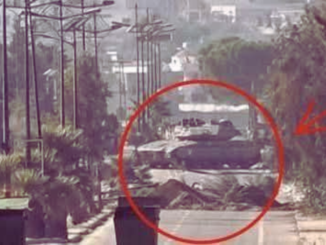
By Benay Blend
“Marvel’s new superhero is actually a monster,” explains the writer/activist Susan Abulhawa, “just like the powerful Zionist propagandists doing all they can to normalize their horrendous colonial project.” Included in a forthcoming Marvel film, “Captain America: New World Worder,” Sabra, a Mossad agent, “normalize[s] a state intelligence agency,” writes journalist Ramzy Baroud, “which is known for its numerous bloody assassinations, sabotage and torture.”
The latest Israeli superwoman, Baroud continues, should be placed within a context, that of “the rational progression of the Israelification of Hollywood.” From Paul Newman’s “Exodus” to “Wonder Woman” star Gal Gadot, a former Israeli soldier, there has been an increasing effort to justify the creation of the Zionist state, an enterprise that has now moved on to glorifying its forces that uphold the state by any means deemed necessary.
A joint production of Marvel Comic Universe (MCU) and Disney, the comic will have Israeli actress Shira Haas cast as ‘Sabra’ in the upcoming Captain America franchise, New World Order. The character Sabra dates back to a comic book that features the murder of a young Palestinian child, who is portrayed as a criminal, and she has been featured approximately 50 times since, her job mostly fighting “terrorists.” Her appearance has long played a role in Israel’s propaganda war which strives to demonize Palestinians while normalizing the occupation. To Israeli Jews, Sabra means a person born in Israel; to Palestinians, it calls to mind a much more sinister meaning.
Almost immediately Palestinians and their allies around the world responded to the news. In one of the many petitions on social media, American Muslims for Palestine (AMP) writes: “For Marvel and its parent company Disney to promote a character that not only normalizes an apartheid government and its murderous intelligence agency, but heroizes and lionizes them is deeply troubling,” and to do so at a time when Israel is under scrutiny for its crimes against humanity, leads AMP to question the very integrity of Disney’s Marvel franchise.
“By glorifying the Israeli army & police, Marvel is promoting Israel’s violence against Palestinians & enabling the continued oppression of millions of Palestinians living under Israel’s authoritarian military rule,” writes the Institute for Middle East Understanding, a U.S.-based organization, on Twitter.
“People forget Baba Walt [founder of Walt Disney studio] was snitching on folks,” recalls activist/organizer Mawusi Ture, “part of all the McCarthy era anti-communism back in the 1950s, 1960s.” Perhaps it’s fitting, then, that the word “Sabra” conjures for Palestinians the memory of the massacre of Palestinian refugees in the Sabra and Shatila camps in Lebanon, with help from the Israeli military.
While many lives were destroyed by the McCarthy hearings, very few politicians were held responsible for the gross miscarriage of justice. Similarly, US officials and mainstream media ignored the anniversary of Sabra and Shatila in September, which bizarrely coincided with announcement of the Marvel film.
Shortly after the last election, journalist Jacqueline Luqman wrote:
“I’m sure the Palestinians whose homes are being bulldozed by the apartheid government of You-Know-Where will be happy that the US embassy won’t be moved from where Trump moved, and that the oppression and ethnic cleansing against them will now be carried out with decorum under Biden.”
Two years later, not much has changed. “Again,” responded Erica Ryan, an organizer for Black Alliance for Peace, “representation is a psyop,” psychological warfare aimed at influencing the state of mind of a targeted population. In this case, the audience consists of vulnerable young people, for whom the image of Palestinians (and really, all people who are deemed the Other) as terrorists will be reinforced, while Sabra, the Mossad Agent, appears to be a heroine.
As Palestinians were reacting with dismay to Disney’s Sabra, other parents were recording their children’s reaction to Disney’s remake of The Little Mermaid, this time with a black heroine. Caste in the role as Ariel, Halle Bailey sports red locks, as opposed to the previous film where the leading character was white.
Reaction varied. “Seeing an actual manifestation of something you love and are passionate about makes that thing more realistic and makes you feel included; that’s my hope for them,” said Sterling Shanks, who recorded his daughters — Ke’Iona, Lai’Anna, 7, and Ea’Iona, 2 — as they watched the trailer. “Seeing Halle Bailey as Ariel makes something they love more attainable and relatable.”
Other parents reported the same response. They felt that it was important for their daughters to see someone on the screen who looks like them, especially if it’s an actress who many consider beautiful. Nevertheless, some on social media have used the hashtag #NotMyAriel to convey that a Black actress is not in line with the original Hans Christian Anderson fairy tale, which was initially published in Denmark in 1837.
Of course, most began with the disavowal: “I’m not racist but…” which is nevertheless followed by a clearly racist statement. For example: “See what pollution has done to our mermaids”; “One of the most beautiful moments on The Little Mermaid was Ariel using a fork to comb her hair….how y’all gone remake that with dreadlocks #notmyariel,” and more of the same sentiment.
Most likely the negative comments were not about the color of a mermaid, who in the end isn’t real at all. For those who have been inculcated by society that people of color are inferior its clearly disturbing to see black women in any role that doesn’t reflect subservience.
Women of color have long written about the dilemma of matching up to mainstream notions of beauty. Toni Morrison’s The Bluest Eye (1970), for example, features Pecola Breedlove, a young black girl, who prays every day for blonde hair and blue eyes that she believes would allow her entry into a better world than the one in which she lives.
Much later, Ramona Emerson’s Shutter (2022) follows Rita Todacheene, who left the Navajo Reservation to live with her mother in Santa Fe, New Mexico. There she attended Our Lady of Guadalupe Elementary where her “new classmates glowed with the excitement of knowing [she] was different.” In their eyes, which she noted were not deep brown like hers, she became “the dirty Indian, now sitting among all the white and Spanish faces, all who disliked [her] more than any reservation schoolyard bully ever could” (p. 130).
While Todacheene’s early experience resonates with sadness, readers can find comfort in someone who shared their feelings but survived. “To be darker means to experience more pain, more racism, less hope, less self-esteem, less advantage” (“The Two Lives,” in I Tell You Now: Autobiographical Essays by Native American Writers,” Eds. Brian Swann and Arnold Krupat, 1987, p.243), writes Linda Hogan (Chickasaw). Hogan relates that she eventually found a way out through literature—Audre Lorde, Meridel Le Sueur, Tilly Olson, and D’Arcy McNickle, working class and Native writers who were engaged, like her, in the same “struggle for survival” (p. 243).
“Writing is my primary crowbar, saw, and hammer,” Hogan explains (p. 244). “It is a way of not allowing ourselves to be depowered by disappearance.” In her books in Arabic for young children, Taghreed Najjar also fills a vacuum. For example, in Against the Tide (2014), a young adult novel translated by Elisabeth Jaquette, Najjar relates how a young woman defies expectations to become the first fisherwoman in Gaza.
Does inclusion and representation result in structural change in society? Most likely not. Diversity committees are typically about learning to appreciate another culture, but they do not necessarily result in meaningful socioeconomic changes in society.
On Black Agenda Radio, Liberation Through Reading founder Erica Caines talks about her mission. “I believe in our ability to educate our own children,” said Caines, who wants to raise a generation of revolutionaries. Reading is necessary to foster “internationalism, an understanding of how we’re connected in our own liberation struggles,” she said. To that end, she has distributed over 1,500 books to children in several cities.
In 2018, Ramzy Baroud, editor of Palestine Chronicle, covered an Israeli attack on a school south of Nablus in the West Bank, on the pretext that the building was a “site of popular terror and rioting.” In fact, students were actually protesting illegal Jewish settlements that were encroaching on neighboring land.
Despite military occupation and settler violence, the Palestinian population, reports Baroud, has one of the highest literacy rates in the Middle East. This should come as no surprise, he explains, as the “first wave of Palestinian refugees that were ethnically-cleansed from historic Palestine were so keen on ensuring their children strive to continue their education, they established school tents, operated by volunteer teachers as early as 1948.”
Erica Caines, through Liberation Through Reading, and Taghreed Najjar, through herAl Salwa publishing house, both promote a valuable mode of learning. Palestinians, in particular, understand, concludes Baroud, that “education is their greatest weapon” to reclaim their freedom and their land, and this explains Israel’s “relentless and systematic targeting” of Palestinian schools.
Marvel’s latest film “Sabra” falls in line with Israel’s agenda, what Baroud identifies as “the larger war on Palestinian identity, freedom, and, in fact, the very existence of the Palestinian people.” What makes it so insidious is that it teaches young Israelis, and others too, that somehow the Mossad’s actions—in fact, extra judicial killings–around the world should be viewed as heroic.
“It can only be assumed that with a multi-million dollar investment behind this film, she [Sabra] is here by design and with a calculated purpose,” writes Nadine Sayegh, specifically to help with recruitment in other countries. Because this kind of propaganda is not only pervasive, but it is also words that lead to action, it is more important than ever for liberation struggles to counter with educational tools of their own.

– Benay Blend earned her doctorate in American Studies from the University of New Mexico. Her scholarly works include Douglas Vakoch and Sam Mickey, Eds. (2017), “’Neither Homeland Nor Exile are Words’: ‘Situated Knowledge’ in the Works of Palestinian and Native American Writers”. She contributed this article to The Palestine Chronicle.







